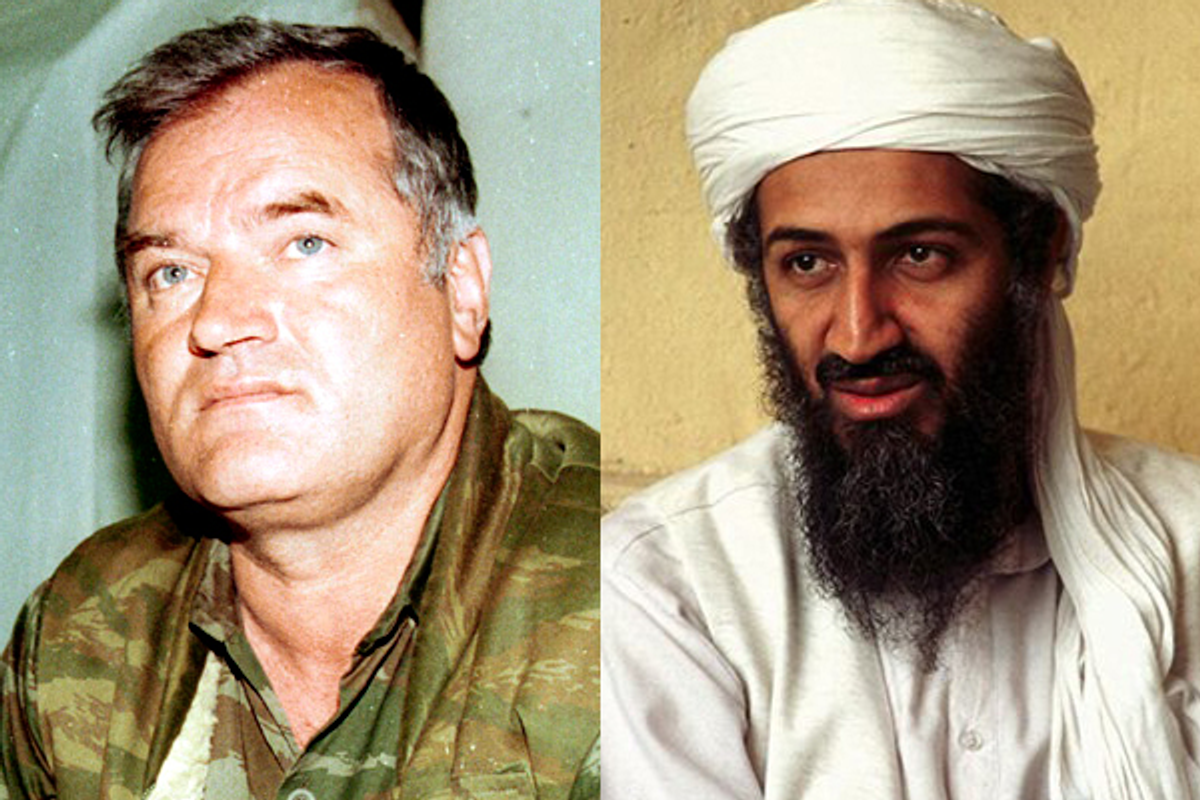Upon hearing Thursday's news that suspected Bosnian war criminal Ratko Mladic had been found and arrested, President Obama issued a statement saying he "looks forward to [Mladic's] expeditious transfer" to the international court for trial because that means he "will now have to answer to his victims, and the world, in a court of law." In his statement, Obama specifically cited the legacy of the Nuremberg trials as proof that "the United States has long viewed justice for war crimes, crimes against humanity, and genocide as both a moral imperative and an essential element of stability and peace." This is a very different kind of rhetoric than we heard last month, when the president announced that accused war criminal Osama bin Laden had been summarily killed and therefore "brought to justice" -- without, of course, "having to answer to his victims, and the world, in a court of law."
How can we make sense of the discrepancy?
Some might argue that Nuremberg-like trials can occur only after an accused war criminal is no longer a threat to the world. This was the line of reasoning floated by some Obama administration supporters last month with regard to bin Laden. The idea was that since he remained an active threat to the world, we couldn't put him on trial, because his minions would violently retaliate during the court proceedings (those who made this argument insisted that the Nazis could have only been put on trial at Nuremberg because Nuremberg happened after World War II). But, then, like bin Laden, Mladic was still an active threat when he was captured -- if not to the whole world, then at least to Bosnian Muslims. Indeed, Voice of America reports that Mladic was being actively "protected by some of those who still hold power in Serbia" -- power that could ostensibly be used in violent retaliation when Mladic goes on trial. And yet, nobody is suggesting he can't be put on trial -- in fact, quite the opposite.
So how can our government tell us that when it comes to one accused war criminal, it "looks forward" to a trial in order to achieve "international justice," but that for other accused war criminals, no such trial is necessary to make sure "justice has been done?"
Three explanations are possible:
1. Mladic is a white guy accused of killing 8,000 Muslims, while bin Laden and Al Qaeda operatives are non-whites accused of killing (at least) 3,000 people, most of whom were not Muslim. Perhaps our government is admitting that it believes white people accused of killing thousands of Muslims deserve due process, while non-white Muslims accused of killing thousands of non-Muslims do not deserve due process.
2. Mladic is accused of killing 8,000 Bosnians, bin Laden was accused of killing 3,000 Americans on 9/11. Maybe this is an example of a perverse form of American exceptionalism -- specifically, our government believing that those accused of killing foreigners deserve due process, but those accused of killing Americans do not.
3. Mladic was a part of an internationally recognized government when he allegedly committed his war crimes. Bin Laden was a stateless terrorist when he committed his crimes. Maybe our government is saying that if one marshals the apparatus of an official state to kill thousands of people, one deserves due process, but that if one kills thousands of people without state sanction, one deserves does not. In other words, perhaps our government is saying that one form of mass murder is somehow more acceptable -- and thus more deserving of a legal court inquiry -- than another.
For the sake of clarity, it's worth trying to find out which of these explanations is at work. At minimum, it might help Americans better understand what premises its government is acts on -- and it might give the world a better idea of how America defines "justice."



Shares